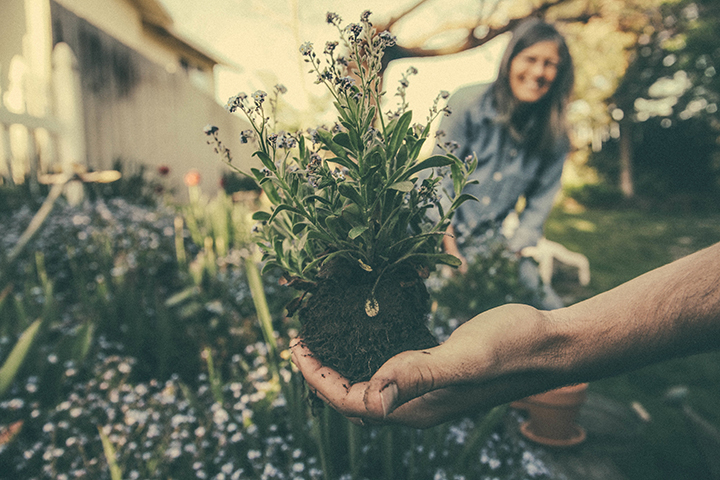
Most of the world’s population live in cities. And in a culture accustomed to multi-lane roads, super-size trashcans, plastic bags galore, gas on-demand, and limitless construction, it’s easy to overlook trees, flowers, streams, or even fresh air.
But the Bible says that people can see the Spirit of God in the things He has created:
“For since the creation of the world God’s invisible qualities–his eternal power and divine nature–have been clearly seen, being understood from what has been made,” (Romans 1:20, NIV).
In the same way that people can ignore God’s presence in creation, it’s also easy to overlook our consumption of the world’s resources.
Followers of Christ often try to be faithful stewards of everything they own, because really, God owns it. Good stewardship often is measured by the way people spend money or treat others, but what if it was also measured by our use of the world’s resources?
Even though every person will eventually pass away, people understand that it is important to take care of their bodies as best they can. When we care for our bodies, it honors God; after all, the body is the “temple of the Holy Spirit” (1 Corinthians 6:19).
But the earth belongs to God, too: “All things were created by Him and for Him. He is before all things and in Him all things hold together,” (Colossians 1:16-17).
“All things were created by Him and for Him …”
Jesus taught that people should not just use what is readily available. He encouraged his followers to exercise caution with what they consumed: “[Jesus] said to them, ‘Watch out! Be on your guard against all kinds of greed; a man’s life does not consist in the abundance of his possessions'” (Luke 12:15).
BREAKING THE POWER OF OVERINDULGENCE
In North America, most consumption is wasteful and contributes nothing to the quality of people’s lives. Nearly every kind of plastic, from plastic bags at the supermarket to plastic bottles out of the vending machine, takes several thousand years to decompose. Styrofoam also lasts forever, yet it is recyclable.
Plastic takes several thousand years to decompose.
Trash does not simply disappear; it goes somewhere, so it is either thrown into a landfill, cast off onto the side of the road, or it is recycled for further use. Much waste can be avoided if people choose to have temperance with what they use.
Christ repeatedly identified Himself with poor people and with those who lived simply. He asked His followers to not rely on themselves, but rather, to trust God.
The Bible says, “Then he said to them all: ‘If anyone would come after me, he must deny himself and take up his cross daily and follow me. For whoever wants to save his life will lose it, but whoever loses his life for me will save it. What good is it for a man to gain the whole world, and yet lose or forfeit his very self?'” (Luke 9:23-25).
Many great saints in the Bible chose to deny themselves worldly comforts in some way, and this allowed them to grow closer to God.
Great saints in the Bible chose to deny themselves worldly comforts.
Moses fasted when he was seeking God’s will, and Daniel refused to partake of the king’s luxuries when they were offered to him. Instead he prayed and sought God’s will, which gave him the strength to resist temptation later. John the Baptist lived simply, and other people thought he was strange; but he was able to hear God’s voice more clearly.
Studies show that today, younger people are saving much less of their income; oftentimes, they do not have enough when emergencies occur because they are not denying themselves the indulgences of life. Many in the consumer culture are overusing and overspending on things we think we need, but all the while, God is asking us to trust Him for our needs and to limit our use of the world’s resources.
How much are you using? How much less could you use?
Many in our consumer culture are overusing and overspending on things we think we need.
LESS IS MORE
When God created the earth, he entrusted it to people so that they would cultivate it, not exploit it. The Bible says, “The LORD God took the man and put him in the Garden of Eden to work it and take care of it” (Genesis 2:15).
In the same way Jesus did not go around asking for more and consuming more. Instead He went about scattering seeds of generosity. He was not a consumer, but a giver.
Jesus said, “Happy are the meek, for they will inherit the earth” (Matthew 5:5). The word “meek” does not mean “weak.” Meekness really means modesty. Jesus is saying here that people who are humble in their actions and attitudes will become happy and blessed.
Jesus was not a consumer, but a giver.
Doesn’t everyone want to be happy and blessed?
More than 1 billion people in the world lack access to clean water. Show respect for human lives created in the image of God, and begin limiting your use of water and giving to ministries that provide clean water for those who do not have access to it.
The Bible says, “One man gives freely, yet gains even more; another withholds unduly, but comes to poverty. A generous man will prosper; he who refreshes others will himself be refreshed” (Proverbs 11:24-25).
If you have extra stuff–which many people do–give it away; or sell it, and give the money to those in need. Jesus said, “Sell your possessions and give to the poor. … For where your treasure is, there your heart will be also” (Luke 6:33).
If our hearts are with our treasure, then it’s safe to assume that we’ve forgotten altogether about where our trash is. Yet trash continues to pile up, dirtying the environment, taking up space, and polluting valuable resources that humans need for life.
How much do you own? How much can you give away? How much can you recycle?
Reducing waste and pollution is part of loving our neighbors too. Smog, soot, and exhaust are all physically unhealthy for people and the environment. Pollution contributes to countless cases of asthma and even cancer every year, and harmful waste ruins the land and drinking water.
When will we say enough?
It’s easy to follow the world’s lead and just consume whatever is within reach, but when will we say enough? In the end, God leaves people responsible for the care of the earth and for the care of other people. Future generations will inherit the earth.
Consuming in excess is a sin, so make it a goal this Earth Day to start traveling light and reducing your harmful impact on the environment for the glory of God.
Simple Tips for Reducing Consumption:
- Limit your use of all plastics
- Bring reusable bags to the grocery store
- Recycle plastic, paper, glass, aluminum, cardboard, or other recyclables
- Take shorter showers
- Unplug any appliances when you are not using them
- Turn off the lights when you leave a room
- Give stuff away
- Pick up litter
- Use a reusable water container instead of buying bottled water
- Carpool with neighbors
- Tithe, and give generously
- Spend time outdoors, enjoying God’s creation!

